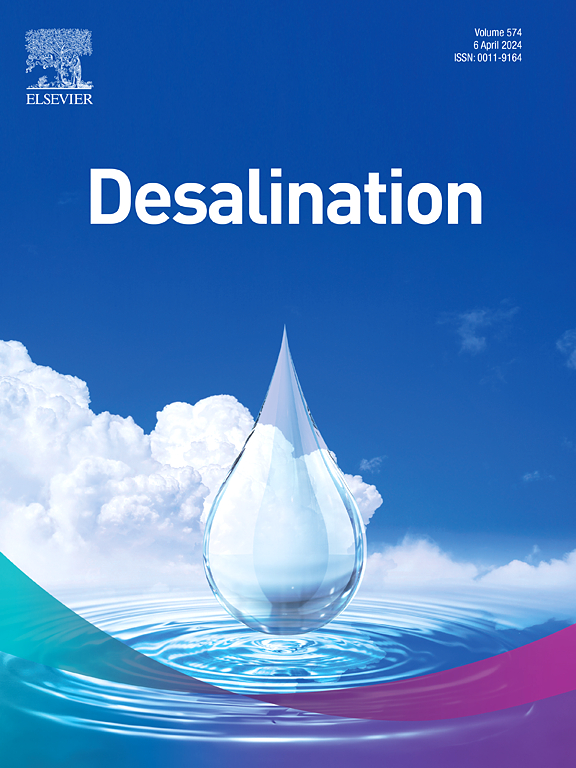有价金属的电化学回收研究进展:以锂为重点
IF 8.3
1区 工程技术
Q1 ENGINEERING, CHEMICAL
引用次数: 0
摘要
由于锂在储能系统中的重要作用,锂的需求一直在大幅增加。这暴露了太阳能蒸发和硬岩开采等传统提取工艺的严重局限性。这些方法通常存在加工时间长、锂选择性低、土地占用大、破坏环境等问题。因此,越来越需要更清洁、更有选择性的替代品。盐湖卤水、海水、地热卤水和电池回收流等不同来源的回收带来了新回收技术的探索和发展。电化学技术通常比传统方法(包括硬岩开采、太阳能蒸发等)更紧凑,副产物废物处理负担更低。反过来,这有助于最大限度地减少景观破坏,降低锂提取作业的生态足迹。电化学方法的另一个重要优点是,它们通常不使用会导致土壤和地下水污染的化学物质;因此,它们是更干净的过程。本文综述了有价金属电化学回收的最新进展,重点介绍了利用电容去离子(CDI)和电渗析(ED)等方法从各种来源回收锂的方法,这些方法都具有效率和选择性,对环境的影响较小。此外,本综述旨在提供对电化学过程的基本了解,并汇编其对减少环境影响的贡献,同时强调其与绿色提取范例的可行性,这些范例在背景下解决了对传统高影响采矿过程的依赖。此外,还提出了CDI与分级浸没膜蒸馏结晶器(F-SMDC)耦合、F-SMDC与电结晶器集成等混合电化学工艺,以提高电化学方法的锂提取性能。本文章由计算机程序翻译,如有差异,请以英文原文为准。

Advances in electrochemical recovery of valuable metals: A focus on lithium
Lithium demand has been increasing greatly due to its primary importance in energy storage systems. This has exposed critical limitations in traditional extraction processes such as solar evaporation and hard rock mining. These methods usually suffer from long processing times, low lithium selectivity, extensive land use, and are environmentally disruptive. As a result, there is a growing need for cleaner, more selective alternatives. Recovery from different sources such as salt lake brines, seawater, geothermal brines, and battery recycling streams has brought the exploration and development of novel recovery technologies. Electrochemical techniques are usually more compact and present a lower by-product waste disposal burden than conventional methods, including hard rock mining, solar evaporation, etc. This in turn, helps in minimizing the landscape disruption and lowering the ecological footprint of lithium extraction operations. Another important advantage of electrochemical methods is that they do not usually employ chemicals that would result in soil and groundwater pollution; thus, they are much cleaner processes. In this work, the recent advances in the electrochemical recovery of valuable metals are summarized with special emphasis on lithium recovery from various sources using processes such as capacitive deionization (CDI) and electrodialysis (ED), all carrying efficiency and selectivity, with less impact on the environment. Furthermore, this review aims to offer a basic understanding of electrochemical processes and compile their contributions toward environmental impact reduction while highlighting their viability alongside green extraction paradigms that tackle, in context, the reduction of the dependence on traditional high-impact mining processes. Additionally, hybrid electrochemical processes such as coupling CDI with a fractional submerged membrane distillation crystallizer (F-SMDC), and the integration of F-SMDC with electrocrystallization are suggested to improve the lithium extraction performance of electrochemical methods.
求助全文
通过发布文献求助,成功后即可免费获取论文全文。
去求助
来源期刊

Desalination
工程技术-工程:化工
CiteScore
14.60
自引率
20.20%
发文量
619
审稿时长
41 days
期刊介绍:
Desalination is a scholarly journal that focuses on the field of desalination materials, processes, and associated technologies. It encompasses a wide range of disciplines and aims to publish exceptional papers in this area.
The journal invites submissions that explicitly revolve around water desalting and its applications to various sources such as seawater, groundwater, and wastewater. It particularly encourages research on diverse desalination methods including thermal, membrane, sorption, and hybrid processes.
By providing a platform for innovative studies, Desalination aims to advance the understanding and development of desalination technologies, promoting sustainable solutions for water scarcity challenges.
 求助内容:
求助内容: 应助结果提醒方式:
应助结果提醒方式:


